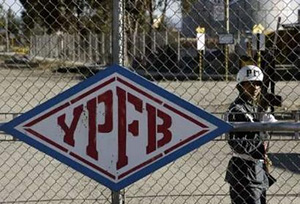 |
 |
 |
 Editorials | May 2006 Editorials | May 2006  
All Smoke, No Fire in Bolivia
 William Powers - NYTimes William Powers - NYTimes


| | A Bolivian soldier stands guard at the entrance of the YPFB (Yacimientos Petroliferos Fiscales Bolivianos) gas plant in Senkata, near El Alto May 6, 2006. Foreign energy companies in Bolivia have agreed to start renegotiating their contracts with the government, fulfilling a requirement laid down by President Evo Morales after he nationalized the national gas industry. (Reuters/David Mercado) |
La Paz, Bolivia - Out for a stroll here this past Monday, I stopped in my tracks. Bolivian soldiers had surrounded my local gas station, where a banner read, "Property of the Bolivian State." They were among several thousand soldiers posted at the more than 50 oil fields and refineries around this landlocked nation, which holds the continent's largest natural gas reserves after Venezuela. Latin America's newest populist leader, President Evo Morales, had just issued a decree nationalizing Bolivia's petroleum.

In reaction to the news, the European Union warned that the move could tighten global energy supplies and increase prices at the pump. Other international analysts have expressed concern about a resurgence of dangerous "energy nationalism." However alarming Bolivia's move might appear on the surface, though, there is surprisingly little in it to worry the United States and the West.

This is simply the way democracy sometimes works. Oil and gas nationalization has been the main political issue in Bolivia for the last several years. Mr. Morales, an Aymara Indian farmer, won a landslide victory in December on a promise to nationalize the gas industry. Now he's delivering on that promise he made to the country's nine million citizens.

And when viewed from a Bolivian perspective, this is less of a nationalization than a return to constitutionality. Mr. Morales has a strong legal argument that the privatization that took place in the mid-1990's was unconstitutional. Under the Bolivian Constitution, the contracts that gave control to private companies were supposed to be approved by Congress, and they were not.

Add this to resentment on the street over Bolivia's Transparency International corruption ranking last year (placing its leaders among the world's most dishonest) and a long history of swindles where natural resources like gold, silver, timber and petroleum have been "privatized" into the global economy to the sole benefit of a few very wealthy Bolivians.

Nor is this a classic nationalization in the sense of the confiscations that took place in the region in the 50's and 70's. In those days, Latin American governments expropriated everything and kicked out the companies the next day. This time Bolivia will exert greater control over the companies, including significantly higher taxes and 50 percent-plus-one state ownership, but Mr. Morales has pledged to create an environment conducive to private profit-making, and the government has repeatedly stated that it is a "nationalization without confiscation," with no expulsion of foreign companies nor expropriation of their assets.

Then why did Mr. Morales send in the army? In a word, politics. His dramatic televised decree — delivered in a hard hat from a Tarija oil field — was necessary to placate masses of radicalized Bolivians who demand "confiscation without compensation" to the companies. The majority of Bolivians support nationalization out of acute frustration over two decades of failed "neoliberal" policies by the International Monetary Fund, which tied sorely needed loans to privatization, debt reduction and relaxation of labor standards.

Bolivia was one of the first Latin American countries to adopt this approach back in the mid-1980's. State-owned companies were sold off. Government spending and regulation was scaled back. Foreign capital was courted. All on the promise of a new dawn of well-being.

Twenty years later the average Bolivian is worse off than before. Exports have declined. Bolivian incomes are stagnant, and half of the population lives on less than $2 a day. The rest of Latin America has experienced similar results from neoliberalism, leading to a general disillusionment that has given rise to leftist-populist governments.

Even so, some continue to insist that Bolivia's new nationalization policy only makes things worse by scaring off future investments. This does not appear to be true. Although the principal companies invested here — Brazil's Petrobras, Spain's Repsol and Britain's BG Group — have predictably denounced the nationalization, they are not about to pull up stakes. The companies will still profit under the new rules; they won't see the huge profits they enjoyed under lax Bolivian control and the global rally in commodities prices, but they will make money. Shell, which owns 25 percent of an oil and gas pipeline company here, already broke with the other companies by announcing that it remains interested in continuing to "participate in Bolivia's hydrocarbon sector."

The principal danger in Bolivia is that Mr. Morales could go beyond his democratic mandate and detour into a more extreme resource nationalism hostile to democracy that then spreads among Bolivia's energy-rich neighbors. But the world can only hasten such an outcome by trying to punish Mr. Morales.

The world, such as it is, needs gas and oil, and Bolivia and its neighbors need to sell it. Bolivia is just struggling for a way to make markets work.

William Powers is the author of "Blue Clay People" and the forthcoming "Whispering in the Giant's Ear: A Frontline Chronicle from Bolivia's War on Globalization." | 
 | |
 |



